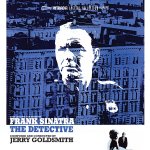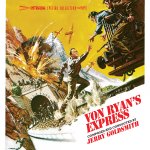


Try
& Buy From

Music Conducted By
Jerry Goldsmith
Orchestrations By
Arthur Morton
Recorded By
-
Performed By
-
Album Produced By
Douglas Fake
Label
Intrada Special
Collection Volume 232
Previous Release(s)
-
Year Of CD/Film Release
2013/1965/68
Running Time
51:26
Availability
Normal
Release
Reviewed By
Loren Spain
Cues
&
Timings
The Detective Album
1. The Detective Main Title 1:37
2. Joe 1:46
3. The School Dance 0:44
4. A New Love 1:07
5. A Family Affair 1:57
6. Beach Scene 0:53
7. The Ball Game 0:33
8. Karen's Story 1:11
9. Night Talk 2:01
10. The Safe Cracker 1:59
11. McIver's Story 2:16
12. Joe's Decision 2:20
Von Ryan's Express Album
13. Meet Von Ryan 0:29
14. Entrance To Compound 2:32
15. Ryan Walks Forward 0:45
16. Fire Sale 3:50
17. The Trek Begins 0:54
18. Hiding 1:23
19. Ambushed 1:23
20. Boxcar 0:52
21. Welcome To Rome 1:47
22. Farewell To Rome 0:47
23. A New Crew 0:44
24. The Love Birds 0:53
25. Mission Accomplished 0:31
26. The Clock Watcher 2:40
27. Dead End Part 1 1:38
28. Dead End Part 2 0:51
29. German Control Center 1:56
30. End Titles 0:48
The Extras
31. Welcome To Rome (Mono Version) 1:51
32. Funeral Sequence 1:48
33. Fire Sale (Alternate Take) 4:14
Soundtrack
Ratings
Disappointing

Functional

Average

Good

Excellent

Outstanding

|
The Detective/Von Ryan's
Express
There couldn't be a more telling example of Jerry
Goldsmith's range and dexterity as a composer of film music than the scores he
wrote for the pair of films -- "The Detective" and "Von Ryan's Express" -- that
are presented on this CD issued recently by Intrada. The folks over at Intrada
devote themselves to releasing finely mastered soundtrack recordings from films
produced all over the world, and their CD's are always attractively packaged
with colourful graphic artwork, stills from the films, and insightful,
entertaining commentary from knowledgeable observers of the film music scene.
Jerry Goldsmith's score for "Von Ryan's Express" -- a very entertaining movie
about Allied soldiers making a break for freedom from a German P.O.W. camp --
shows-off his ability to blend elements of drama, humour and suspense into a
musical whole. Limiting his use of strings to cellos and basses, he conjures up
bright, sparkling and raucously rhythmic martial themes utilizing mostly brass,
woodwinds, reeds and percussion that snap the filmic images of WWII conflict
into sharp relief. But that's not to say there's an absence of melody, which
there isn't, as his main theme has the sparingly tuneful quality of his theme
for "Patton", which he composed five years later.
Also notable in this score is a particular feature of his compositional method
that always thrills me, and that is his dynamic and fluid use of shifting
meters. Simply put, meter describes the way rhythmic patterns are expressed in
music, such as 3/4 "time" for waltzes, 4/4 time for marches, and so on. Jerry
Goldsmith experimented endlessly with the juxtaposition of these varying metric
patterns and in such an aggressive and inspired way that you would think he had
edited the film footage himself. The effect is kinetic and seamless. His amazing
utility with musical time is vividly displayed in track 19, entitled "Ambushed".
In the rest of the score you will find everything that an admirer of music
composed for action films would seek, and in jubilant, go-for-broke quantities.
"The Detective" is a dark, gritty film, mired in a sense of hopelessness over
the persistence of urban crime and the suffering it brings to its perpetrators
and its victims. All of this cinematic despair casts an oppressive pall over the
film that is mercilessly reflected in the swaggering, subterranean, symphonic
blues that Jerry Goldsmith dredged up for it. The score throbs with the anger,
loneliness and violence of the worst aspects of city life.
The main theme on its own is simply a knockout, featuring a searing, soaring,
and tormented trumpet melody that aches with a profound sense of loss as it
wails over a dirge-like saxophone chorus descending like stair steps into hell,
while a keening strings section reaches and strains ever upwards for the light
of redemption and release. As if that weren't enough, the whole thing struts in
time to the rhythm of a dirty, slow-drag tempo spiked with the throb of what
sounds like an electrified bass, and accompanied by some sort of vibrating reed
instrument, perhaps a bassoon, or contra-bassoon that was modified
electronically after its recording. This dramatic and affecting music makes you
think that the composer must have identified quite deeply, and in personal way,
with the characters and story.
Even the emotionally "warmer" cues are stained in cool shades of jazzy blues (or
bluesy jazz!), with brooding chordal harmonies in the strings that sound so lush
and sensuous that you’ll want to listen to them with your eyes closed, tenor
saxophones riffing, bass flutes moaning, pianos tinkling, and harp glissandos
that never resolve. The finer examples of this miasma of mood and feeling in Mr.
Goldsmith's filmic composition would be track 4, "A New Love", track 8, "Karen's
Story", and track 9, "Night Talk".
There's a brief, startling action cue, track 6, "Beach Scene", that
accompanies a desperate foot chase involving the detectives doggedly pursuing a
frightened murder suspect in one of the few scenes shot in the accusing,
exposing glare of daylight. Commenting urgently on the pitched action thrown
on-screen, the music says, “All right, everybody, run like hell!” as it perks up
your ears and doubles your heart rate with its escalating, meter-shifting tempo,
its seemingly improvised pizzicato bass line, its lashing, sassy guitar licks
accompanied by hard-driving, up-tempo cymbal work in the drums section,
punctuated by shrieking flute glissandos that sound like terrified shouts for
help, while high-pitched, angular strings veer jaggedly all over growling
statements in the thickly muted brass section.
If you haven't seen "The Detective", please do so before you listen to this CD,
because the musical score is inextricably connected to the film's dark, dense
and disturbing storyline, its labyrinthine unravelling of the murder mystery,
its nourish mood and 60’s sense of time and place. It's only more proof of what
I have always felt about Jerry Goldsmith, which is that he must have been quite
a sensitive man and also a true musical "chameleon" whose compositions for films
always, always demonstrated his genuine love of what he was doing: writing music
employed in the service of making our movie-going experiences more entertaining,
and perhaps more enlightening, even.
|
|
|
